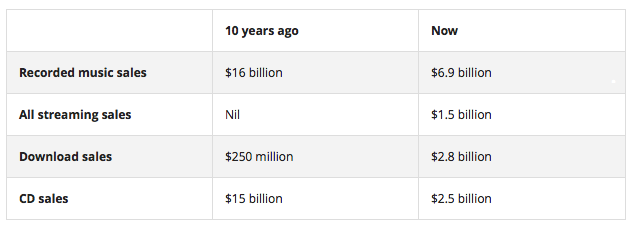Despite the constant back-and-forths and endless stream of pundits attempting to navigate the increasingly convoluted landscape, if there’s two things we can unequivocally say about the current state of the music industry it’s that people are consuming more music than ever and many of them aren’t paying for it.
Most of us already know this. We’ve heard it ad nauseum. In fact, we’ve heard them so much that some of us may even be starting to question just what the actual raw data says, just how far physical music sales have dwindled, and to what extent digital and streaming has been able to make up the difference.
Enter the Recording Industry Association of America (RIAA), who, as Start Up Blog reports, recently unveiled a roundup of numbers that compare the revenue going into the music industry today and the revenue heading that way ten years ago. The results are actually pretty sobering.
Downloads and streaming, as it turns out, aren’t doing much to reclaim lost revenue from the sale of physical formats like CDs. As readers can see in the table below, courtesy of A Journal of Musical Things, while recorded music sales once brought in $16 billion of revenue, they now garner just $6.9 billion.
If we look for the hole in the boat, we’ll find that while CD sales once accounted for $15 billion of revenue, they now account for just $2.5 billion, which would be fine if streaming and downloading were making up that $9.1 billion difference.
Except, they’re not. Though download sales are up to $2.8 billion from $250 million, and streaming is up to $1.5 billion from nothing at all, this accounts for just $4.3 billion of revenue going into the music industry.
In addition to indicating that total revenues have more than halved, and highlighting that the revenue gap is not being filled by new low cost distribution methods of music, as Start Up Blog notes, it may also indicate that the music industry could be well entering its winter years.




































